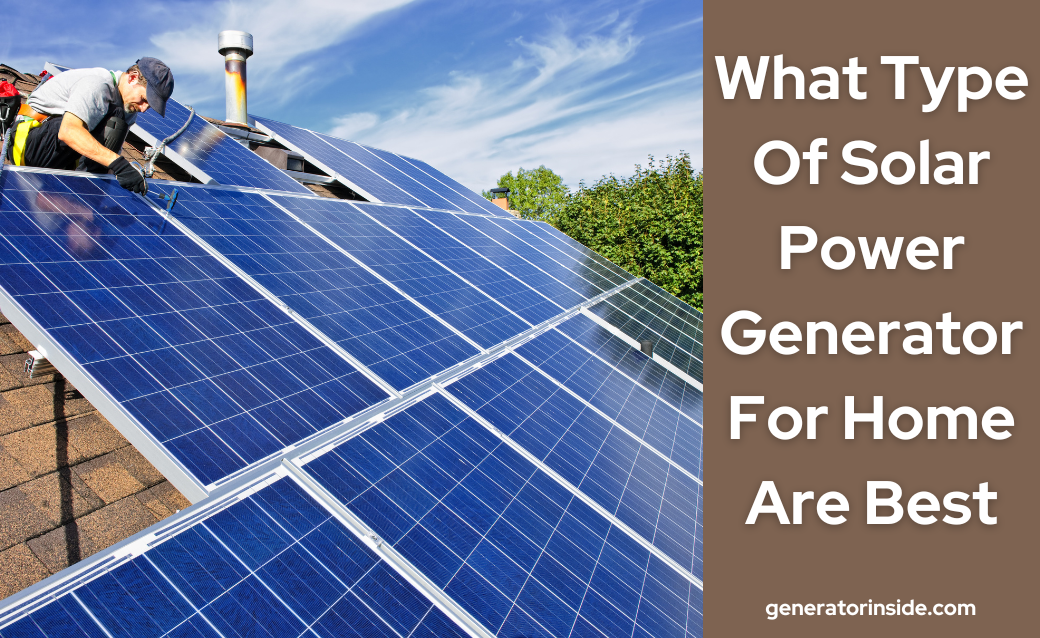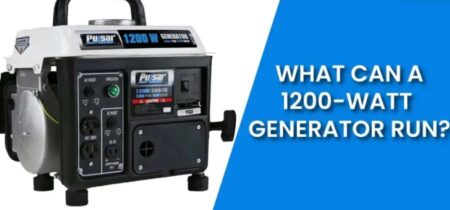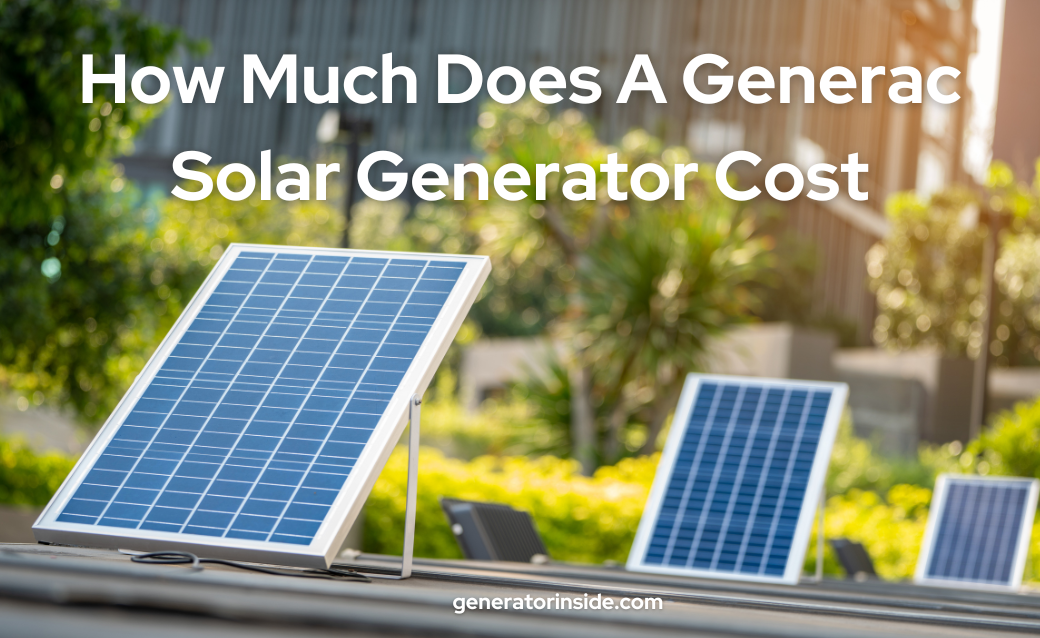
As the world increasingly embraces renewable energy sources, solar power generator for home have become an essential solution for homeowners seeking an eco-friendly and cost-effective alternative to traditional power systems. In this blog, we will explore the ins and outs of solar power generators for home, including the size, type, and backup options that best suit your home’s needs. By using the sun’s energy, you’ll not only save on your energy bills but also contribute to a greener and more sustainable future.
What Size Generator is Needed to Power a House?
To find the right size solar power generator for your home, take the steps given below:
Step 1: Assess your home’s energy consumption
- Calculate your daily energy usage by reviewing your utility bills and noting the total kWh consumed. Divide the monthly kWh consumption by the number of days in the month to obtain your average daily usage.
- Identify peak usage periods by observing your daily routines and noting when multiple appliances, such as air conditioners, heaters, and kitchen appliances, are in use simultaneously.
Step 2: Understand solar power generator capacity
- Familiarize yourself with kilowatt-hours (kWh), the unit used to measure energy consumption. A 1-kilowatt (kW) generator operating for one hour generates 1 kWh of energy.
- To choose the right capacity for your home, aim for a solar generator that can produce enough kWh to match or exceed your daily energy usage. For example, if your daily consumption is 30 kWh, you’ll need a solar generator with a capacity of at least 30 kWh per day.
Step 3: Consider additional factors
- Check for your geographic location and solar resource, as sunlight availability varies with latitude and local climate. Some areas may require larger solar power systems to compensate for fewer sunlight hours or cloudier weather.
- Evaluate energy storage and battery capacity to ensure your solar generator can store excess energy generated during the day for use during nighttime or cloudy periods. A battery with enough storage capacity to hold at least one day’s worth of energy is ideal for most homes.
What Type of Generator is Best for Home Use?
To determine the best type of solar power generator for your home, follow these steps:
- Compare different solar power generator technologies
- Monocrystalline solar panels: Made from a single crystal structure, these panels are known for their high efficiency, typically around 15-20%. They tend to be more expensive than other types but have a longer lifespan and better performance in low-light conditions.
- Polycrystalline solar panels: Composed of multiple crystal structures, these panels have a slightly lower efficiency, usually between 13-16%. However, they are more affordable than monocrystalline panels, making them a popular choice for homeowners on a budget.
- Thin-film solar panels: These panels are made from thin layers of photovoltaic material, offering a lower efficiency of around 10-12%. They are lightweight and flexible, making them suitable for unconventional installations. However, they tend to degrade faster and require more space for the same power output.
- Evaluate efficiency and cost
- Consider panel efficiency and performance: Higher efficiency panels generate more electricity per square foot, requiring less space for installation. However, they often come with a higher price tag.
- Analyze initial investment and long-term savings: While solar power generators require an upfront investment, they can save you money in the long run by reducing or eliminating your monthly electricity bills. Calculate your potential savings by comparing your current energy costs with the estimated costs of your solar power system.
- Consider solar power generator accessories
- Inverters: Choose an inverter that efficiently converts the direct current (DC) produced by your solar panels into alternating current (AC) for home use. There are three main types of inverters: string, micro, and power optimizers, each with its own benefits and drawbacks.
- Charge controllers: Select a charge controller that optimally manages the flow of electricity from your solar panels to your battery storage system, preventing overcharging and maximizing battery life.
- Monitoring systems: Invest in a monitoring system that allows you to track your solar power system’s performance and ensure it’s operating at peak efficiency. Monitoring systems can help you identify any issues or potential maintenance needs.
Why You Should Have a Backup Generator
Having a backup generator for your home is essential due to the unpredictability of power outages and the need to ensure a continuous power supply. Power outages can result from various causes, such as extreme weather events, natural disasters, or grid failures.
In recent years, the frequency and intensity of storms and other extreme weather events have increased, leading to more prolonged and widespread outages. According to a report by the U.S. Energy Information Administration (EIA), on average, U.S. electricity customers experienced just over seven hours of electric power interruptions in 2021.
A reliable backup generator provides a seamless power supply during these unexpected events, ensuring that essential appliances and systems in your home continue to function. This not only provides peace of mind but also protects your family’s safety and well-being, especially during emergencies. For instance, a backup generator can power critical medical equipment, maintain heating or cooling systems during extreme temperatures, and prevent food spoilage by keeping refrigerators and freezers running.
Types of Solar Power Backup Generators
There are several types of solar-powered backup generators available, each with its own advantages and limitations. Remember there’s no one size fits all
1. Solar battery storage systems: These systems store excess energy generated by solar panels in high-capacity batteries which can be used during power outages or when solar production is insufficient. Solar battery storage systems are eco-friendly and silent, making them ideal for residential use. The Tesla Powerwall and the LG Chem RESU are some popular solar battery storage systems. However, these systems can be expensive, and their storage capacity may be limited, requiring careful energy management during extended outages.
2. Hybrid solar generators: These generators combine solar power with traditional fuel-powered generators, offering the best of both worlds. During the day, solar panels generate electricity, while a fuel-powered generator kicks in during periods of low solar production or during outages. This setup provides a more reliable and continuous power supply but may still require fuel storage and periodic maintenance.
3. Traditional fuel-powered generators: While not exclusively solar-powered, these generators can be connected to a solar power system to provide backup energy during outages. Fueled by gasoline, diesel, or propane, these generators are widely available and can supply power for extended periods. However, they emit greenhouse gases and produce noise, which may not be ideal for residential areas. Additionally, they require regular maintenance and fuel storage, which may pose safety concerns.
How to Choose the Right Solar Power Generator for Home?
When selecting the ideal solar-powered backup generator for your home, consider the following factors:
- Capacity and runtime considerations: Determine the amount of energy your home requires during an outage by identifying the essential appliances and systems you need to power. Calculate their total energy consumption in kilowatt-hours (kWh) and choose a backup generator with enough capacity to meet those requirements.
You also have to consider the runtime of the generator, which is the duration it can provide power without interruption. Ideally, your backup generator should have enough runtime to last through the outage or at least cover the periods with low or no solar production.
- Noise, maintenance, and environmental impact: Solar battery storage systems and hybrid solar generators offer a quieter, more eco-friendly alternative to traditional fuel-powered generators. As they produce little to no noise and have a minimal environmental impact, they are better suited for residential areas. However, hybrid generators may still require some maintenance due to their fuel-powered components. Opt for a backup generator that aligns with your noise tolerance, environmental concerns, and maintenance preferences.
- Cost and installation: Evaluate the upfront cost of the solar-powered backup generator and the potential long-term savings on energy bills. Solar battery storage systems and hybrid solar generators often come with a higher initial investment but can offer substantial savings over time.
Compare the costs of different systems and consider any available government incentives, grants, or tax credits that can offset the initial expense. Additionally, factor in the complexity of the installation, which may require the expertise of a professional installer and could add to the overall cost.
Solar power generator for Home Final Words
Solar power generators for home are an increasingly popular and practical solution for those seeking an eco-friendly and cost-effective alternative to traditional power sources. Throughout this guide, we have discussed the importance of determining the appropriate size and type of solar power generator, as well as the value of having a solar-powered backup generator for your home. We’ve also explored various solar power technologies, efficiency considerations, and the essential accessories required for a complete solar power system.
As the world moves toward more sustainable energy solutions, now is the perfect time to consider investing in a solar power generator for your home. Not only will you contribute to reducing greenhouse gas emissions and promoting environmental stewardship, but you’ll also enjoy long-term savings on your energy bills and a greater sense of energy independence.
Also Read:
How To Run a Hydrogen Power Generator to Power Your House?
How to Use a Generator During a Power Outage | 2023 Guide
What is a Small Portable Generator | 2023 Guide
How Much Does a Generac Solar Generator Cost | 2023 Guide









